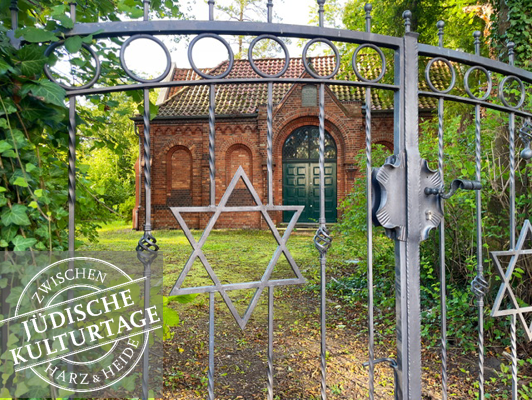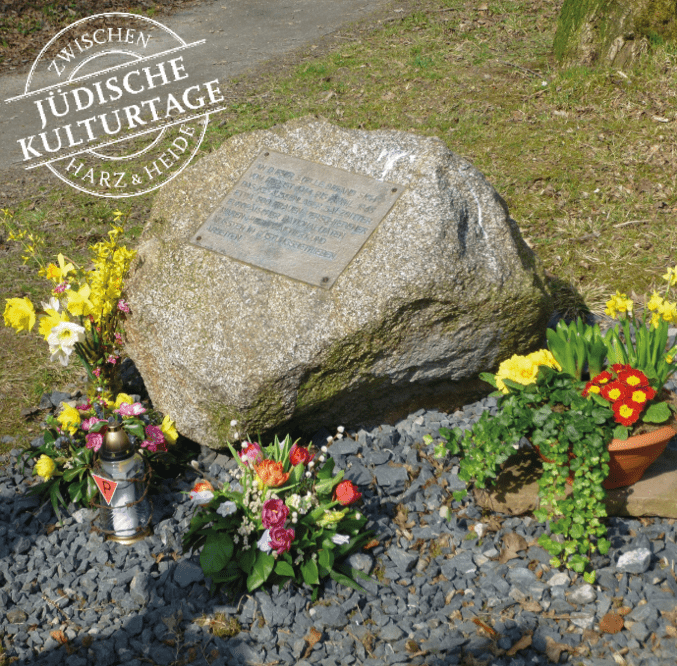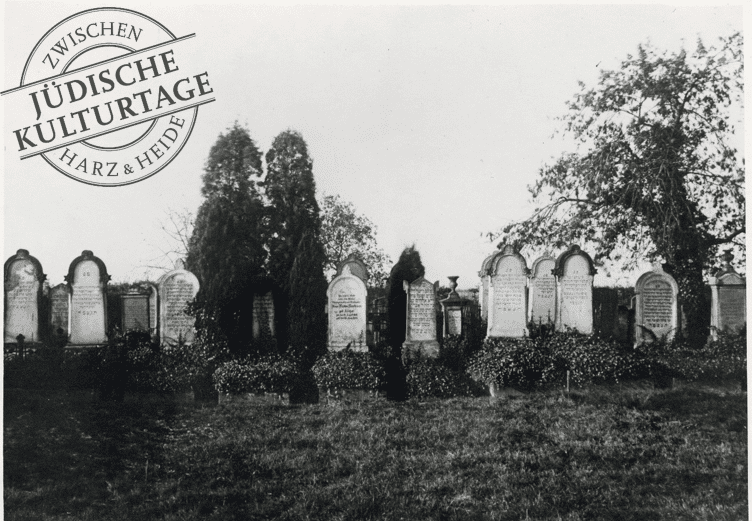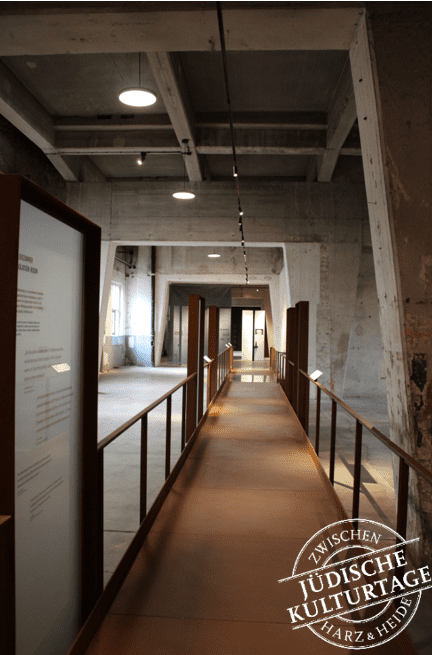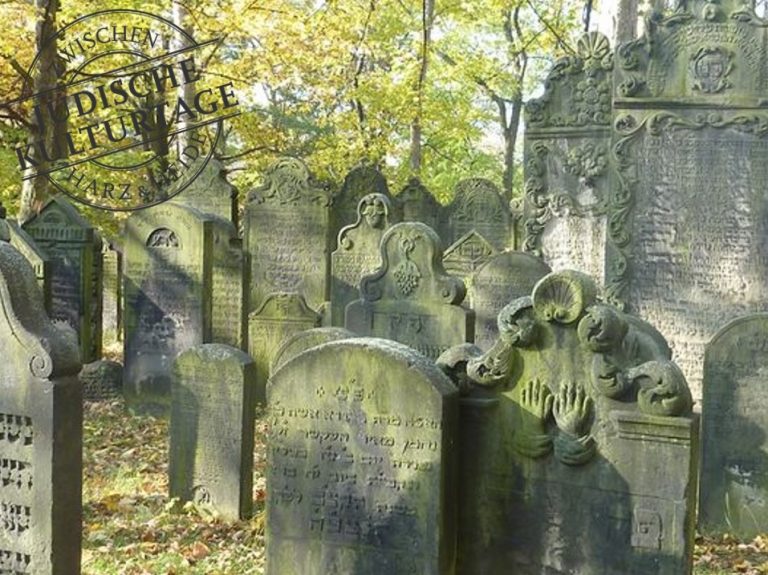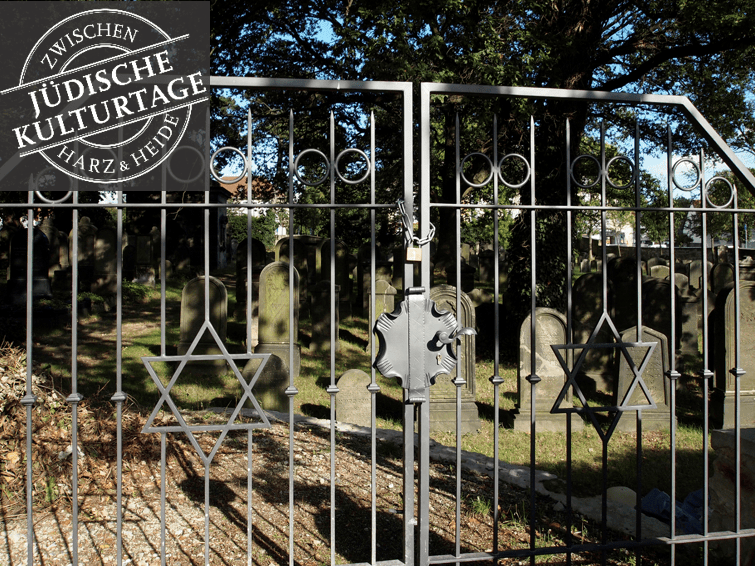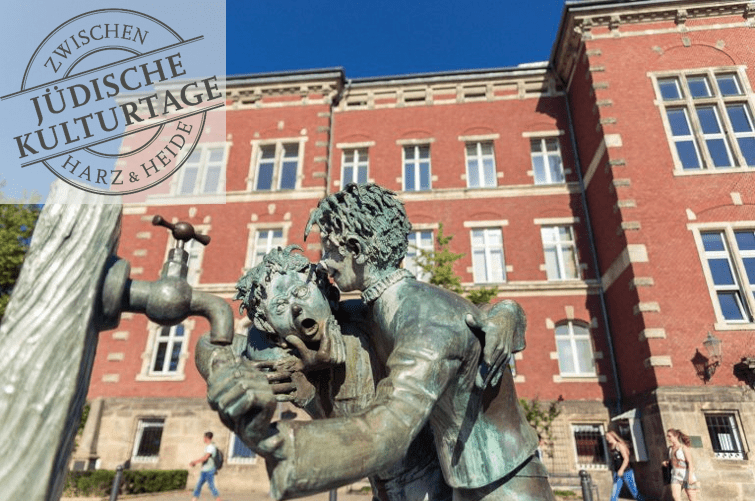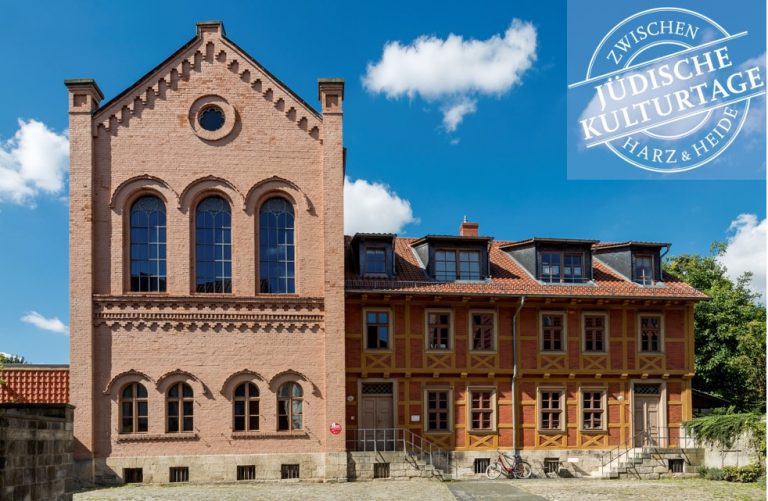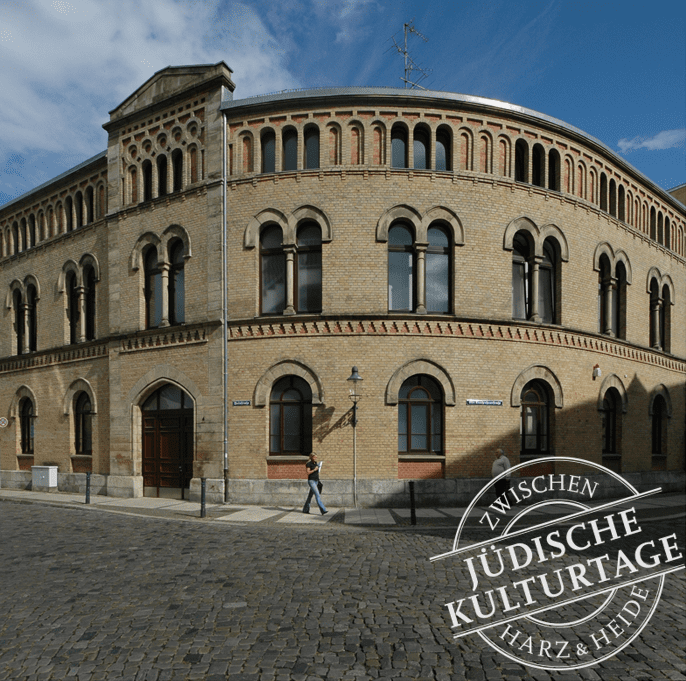Ein jüdischer Friedhof wird als Bet ha-chaijm „Haus des Lebens“ oder als „Der Gute Ort“ bezeichnet. Wir wollen das jüngste, 1892 geweihte „Haus des Lebens“ in Hildesheim mit seiner neugotischen Trauerhalle besuchen und Einblicke in die jüdische Bestattungskultur bekommen.
Der Friedhof in Hildesheim zählt in Niedersachsen zu den größten jüdischen Friedhöfen und ist ein Spiegel der einst so stolzen Gemeinde und deren Untergangs. Nach den Worten von Heinrich Heine: „Unter jedem Grabstein liegt eine Weltgeschichte“ möchte ich exemplarisch einige „Weltgeschichten“ erzählen.
Männliche Besucher müssen auf dem Friedhof eine Kopfbedeckung tragen. Die Teilnahme an der Führung erfolgt auf eigene Gefahr. Die Führung ist nicht barrierefrei.
Treffpunkt: Jüdischer Friedhof, Peiner Straße (gegenüber Haus Nr. 36), Hildesheim
Kosten: 10 €
Anmeldung unter martina.herkelmann@icloud.com
Die Teilnehmerzahl ist begrenzt.
Diese Veranstaltung ist Teil der Jüdischen Kulturtage zwischen Harz und Heide 2025.
Ein jüdischer Friedhof wird als Bet ha-chaijm „Haus des Lebens“ oder als „Der Gute Ort“ bezeichnet. Wir wollen das jüngste, 1892 geweihte „Haus des Lebens“ in Hildesheim mit seiner neugotischen Trauerhalle besuchen und Einblicke in die jüdische Bestattungskultur bekommen.
Der Friedhof in Hildesheim zählt in Niedersachsen zu den größten jüdischen Friedhöfen und ist ein Spiegel der einst so stolzen Gemeinde und deren Untergangs. Nach den Worten von Heinrich Heine: „Unter jedem Grabstein liegt eine Weltgeschichte“ möchte ich exemplarisch einige „Weltgeschichten“ erzählen.
Männliche Besucher müssen auf dem Friedhof eine Kopfbedeckung tragen. Die Teilnahme an der Führung erfolgt auf eigene Gefahr. Die Führung ist nicht barrierefrei.
Treffpunkt: Jüdischer Friedhof, Peiner Straße (gegenüber Haus Nr. 36), Hildesheim
Kosten: 10 €
Anmeldung unter martina.herkelmann@icloud.com
Die Teilnehmerzahl ist begrenzt.
Im Spätsommer 1944 wurde im ehemaligen Zivilarbeiterlager Nr. 43 am südlichen Rande der Stadt nach einigen baulichen Veränderungen als Letztes von vier Außenlagern das KZ Salzgitter-Bad eingerichtet. Am 13. September 1944 kam der erste Transport mit ca. 270 Frauen aus dem Konzentrationslager Ravensbrück an. Nach einem weiteren Transport im Oktober betrug die Belegungsstärke etwa 500 weibliche Häftlinge. Die Frauen mussten in der Rüstungsproduktion arbeiten. Untergebracht waren sie in vier Baracken.
80 Jahre nach der Auflösung des KZ ist das ehemalige Lagergelände ein Parkplatz. Lange erinnerte nur ein Gedenkstein am Rande der Fläche an diesen Ort. In der Führung wird den Strukturen des Lagers nachgegangen und einige Schicksale der dort inhaftierten Frauen ausführlicher vorgestellt.
Treffpunkt: Friedrich-Ebert-Straße (Parkplatz am Ende der Straße), 38259 SZ-Bad
Führung: Jesse Holtmeyer
Die Veranstaltung ist kostenfrei.
Der jüdische Friedhof ist Zeugnis der jahrhundertelangen Existenz einer jüdischen Gemeinde in der Stadt Peine. Heute liegt er versteckt, fast vergessen. Dabei lassen sich an ihm die Phasen jüdischer Geschichte in Peine ablesen: ältere Grabsteine erzählen von der Geschichte der Familien und ihrem Bemühen um Etablierung in der Stadtgesellschaft, ein Gedenkstein erinnert an die vier im Ersten Weltkrieg gefallenen jüdischen Soldaten, ein während des Zweiten Weltkrieges angelegtes Feld mit umgebetteten Toten ist Ergebnis von Überlegungen, den Friedhof während der NS-Zeit zu beseitigen, ein Denkmal aus den 1950er Jahren erinnert an die Verfolgung.
Geleitet wird die Führung von Dr. Jens Binner, Historiker und 2. Vorsitzender des Kreisheimatbundes Peine e.V.
Die Teilnahme ist kostenlos. Um Spenden wird gebeten.
Herren müssen eine Kopfbedeckung tragen.
1942 richtete die SS ein KZ auf dem Gelände der Reichswerke „Hermann Göring“ ein. Mehrere tausend Häftlinge wurden in der Rüstungsproduktion zur Arbeit gezwungen. Für Ihre Arbeitskraft wurde die SS bezahlt, aber ihr Leben hatte keinen Wert.
Doch was hatte im KZ einen Wert? Dieser Frage soll im Rahmen der Führung nachgegangen werden. Ebenso wird ein Blick auf die Gegenwart geworfen: Was ist für uns heute wertvoll zu erinnern und zu zeigen?
Führung: Jesse Holtmeyer
Treffpunkt: Salzgitter AG (Tor 1), Eisenhüttenstraße, 38239 SZ-Watenstedt
(Im gedruckten Programmheft ist der Treffpunkt für diese Veranstaltung leider falsch angegeben. Dies ist der richtige Treffpunkt.)
Foto: Arbeitskreis Stadtgeschichte e.V.
Diese Veranstaltung ist Teil der Jüdischen Kulturtage zwischen Harz und Heide 2025.
Der Alte Jüdische Friedhof in der Nordstadt
Der Friedhof ist ein bedeutendes kultur- und sozialgeschichtliches Zeugnis des hannoverschen Judentums. Wir wollen der Alltagsgeschichte der Juden nachspüren und Einblicke in ihre Bestattungskultur geben.
Männliche Besucher müssen auf dem Friedhof eine Kopfbedeckung tragen.
Die Teilnahme an der Führung erfolgt auf eigene Gefahr.
Wegen des unwegsamen Geländes ist festes Schuhwerk notwendig. Die Führung ist nicht barrierefrei.
Treffpunkt: Alter Jüdischer Friedhof, Oberstraße, 30167 Hannover
Dauer: ca. 2 h
Kosten: 12 €
Anmeldung unter: Tel. 0511 1694166 oder info@stattreisen-hannover.de
Diese Veranstaltung ist Teil der Jüdischen Kulturtage zwischen Harz und Heide 2025.
Nur für besondere Führungen öffnet der alte Jüdische Friedhof an der Hamburger Straße (an der Tram-Haltestelle: Gesundheitsamt) seine Tür für Besucher*innen. Dieser Friedhof wurde 1799 eingeweiht, er wurde bis 1916 genutzt. Da für Jüdinnen und Juden ein Grab ein „Ewiges Haus“ ist, sind alle Grabplätze, soweit sie nicht durch besondere Umstände verloren gingen, erhalten. Das macht den Reiz dieser stimmungsvollen Anlage und seiner Geschichte aus.
Treffpunkt: Jüdischer Friedhof, Hamburger Straße, 38114 Braunschweig
Eine Anmeldung ist bis zum 5.9.2025 erforderlich: info@andere-geschichte.de oder Tel.: 0531 – 1 89 57,
Herren werden gebeten, eine Kopfbedeckung zu tragen.
Foto: Gerd Druwe
Diese Veranstaltung ist Teil der Jüdischen Kulturtage zwischen Harz und Heide 2025.
Wie lebten die jüdischen und christlichen Familien vor mehr als 200 Jahren in der Stadt Seesen miteinander? Wie gestalteten die Menschen ihren Alltag in Seesen? Wie sah es in der Stadt Seesen zu dieser Zeit aus? Begeben Sie sich mit Ihrem persönlichen Stadtführer auf Spurensuche durch eine fast vergessene und einzigartige Stadtgeschichte. Im Mittelpunkt dieser ca. 1,5 stündigen Führung durch die Lehrerfigur Dr. W. Mönch im historischen Gewand steht das Leben, Schaffen und Wirken von Israel Jacobson (geb. 1768 Halberstadt, gest. 1828 Berlin). Der Aufklärer Jacobson gründete vor mehr als 200 Jahren in Mitten der Stadt eine jüdische Freischule – die Jacobsonschule. Jacobson galt als einer der ersten Vertreter und Vorkämpfer für ein liberales Judentum und machte die Region zwischen Harz und Heide zum Ausgangspunkt dieser Reformbewegung.
Die Halberstädter Stadttopografie erlaubt es uns noch heute, die Geschichte der Jüdinnen:Juden als einer religiösen Minderheit in der Stadt beispielhaft für den deutschsprachigen Raum nachzuvollziehen. Beim „Stadtrundgang durch das jüdische Halberstadt“ wird gezeigt, wie Jüdinnen:Juden in Halberstadt lebten und als aktive Bürger:innen die Stadt mitgestalteten.
Treffpunkt: Berend Lehmann Museum, Klaussynagoge, Rosenwinkel 18, 38820 Halberstadt
Kosten: Erwachsene 12 € | Dauer: 150 Minuten.
Tickets: Tourist Information Halberstadt, Berend Lehmann Museum und online über
https://www.reservix.de/veranstaltungskalender?q=j%C3%BCdisches+halberstadt
Diese Veranstaltung ist Teil der Jüdischen Kulturtage zwischen Harz und Heide 2025.
Das Gemeindezentrum mit der im Dezember 2006 eingeweihten Synagoge bildet heute das Zentrum jüdischen Lebens in Braunschweig. Die Jüdische Gemeinde umfasst rund 160 Mitglieder. Die Synagoge an der Steinstraße ist ein Neubau, der im ehemaligen Innenhof der alten Synagoge entstand. Das alte Gotteshaus aus dem Jahr 1875 wurde 1938 zerstört und 1940 abgerissen.
Eine Führung mit Renate Wagner-Redding, Vorsitzende der Jüdischen Gemeinde Braunschweig.
Aus Sicherheitsgründen dürfen keine größeren Taschen und Rucksäcke mit ins Gemeindezentrum gebracht werden. Herren werden gebeten, eine Kopfbedeckung zu tragen.
Der Eintritt ist frei, um Spenden wird gebeten.
Anmeldung bis zum 29.8.2025 unter veranstaltungen@ij-n.de oder Tel. 0178 6723594
Diese Veranstaltung ist Teil der Jüdischen Kulturtage zwischen Harz und Heide 2025.

